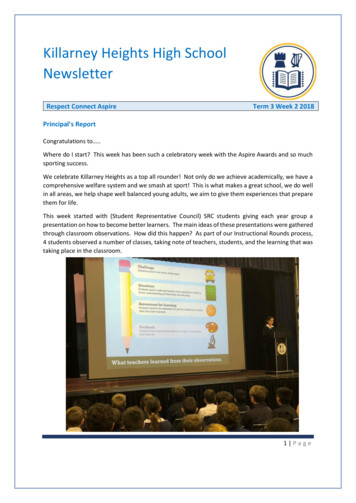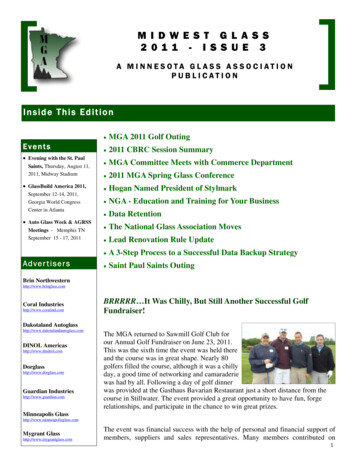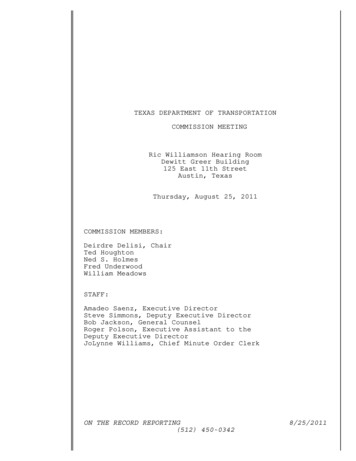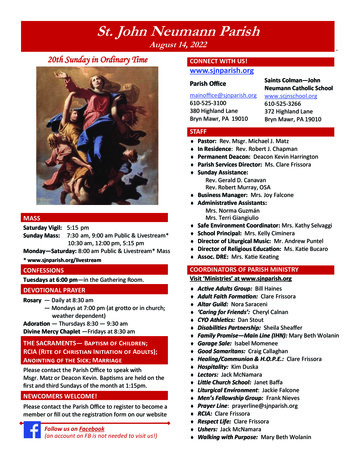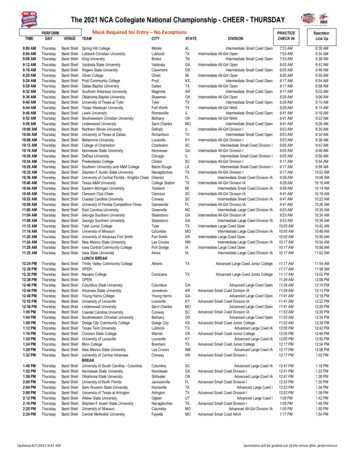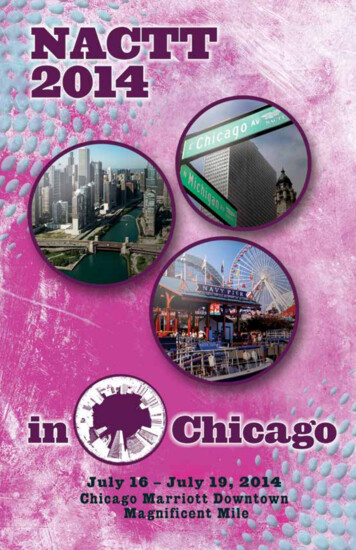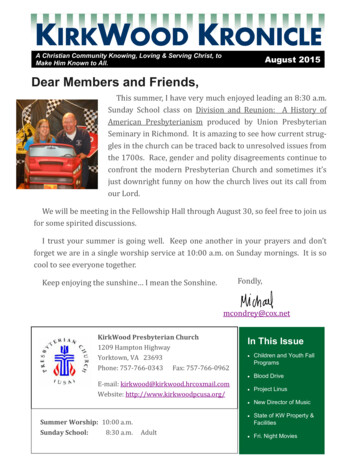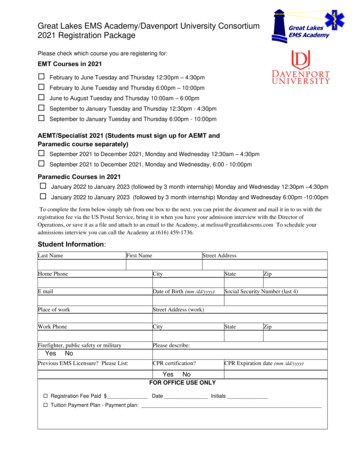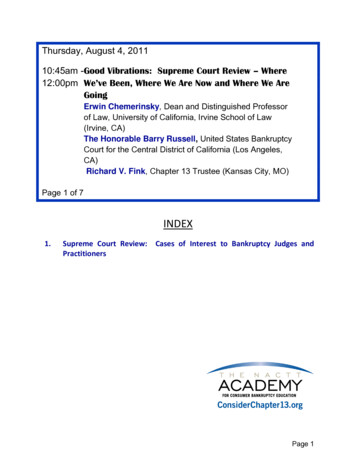
Transcription
Thursday, August 4, 201110:45am -Good Vibrations: Supreme Court Review – Where12:00pm We’ve Been, Where We Are Now and Where We AreGoingErwin Chemerinsky, Dean and Distinguished Professorof Law, University of California, Irvine School of Law(Irvine, CA)The Honorable Barry Russell, United States BankruptcyCourt for the Central District of California (Los Angeles,CA)Richard V. Fink, Chapter 13 Trustee (Kansas City, MO)Page 1 of 7INDEX1.Supreme Court Review:PractitionersCases of Interest to Bankruptcy Judges andPage 1
Supreme Court Review:Cases of Interest to Bankruptcy Judges and PractitionersI.Civil procedureKrupski v. Costa Crociere SPA, 130 S.Ct. 2485 (2010). Relation back ofamendment changing party or naming of party against whom claim is asserteddepended on what party to be added knew or should have known, not onamending party's knowledge or timeliness in seeking to amend pleading.Stern v. Marshall, 600 F.3d 1037 (9th Cir. 2010), cert. granted, 131 S.Ct. 63 (2010).Whether a claim of tortious interference is a “core” matter, or is it only “relatedto” the bankruptcy case, so it was not an issue that the bankruptcy court coulddecide in a final way.II.First AmendmentMilavetz v. United States, 130 S.Ct. 1324 (2010). Lawyers are debt relief agencieswithin the meaning of BAPCPA. Prohibition on assuming additional debt isinterpreted to concern fraudulent debt. Requirement for disclosure inadvertisements is constitutional.III.Criminal LawSkilling v. United States, 130 S.Ct. 2896 (2010). T he federal “honest services”statute, 18 U.S.C. §1346, is not void for vagueness, but is interpreted as beinglimited to bribery and kickbacks.IV.ArbitrationRent-a-Center West v. Jackson, 130 S.Ct. 2772 (2010). The provision of anemployment agreement which delegated to an arbitrator exclusive authority toresolve any dispute relating to the agreement's enforceability was a validdelegation under the Federal Arbitration Act.Page 2
AT & T Mobility v. Concepcion, 131 S.Ct. (April 27, 2011). The FederalArbitration Act preempts a California court decision that held that a class banembedded in an arbitration clause is unenforceable.V.Civil rightsThompson v. North American Stainless, 131 S.Ct. 863 (2011). The federal lawprohibition against retaliation against those filing a complaint of employmentdiscrimination also forbids an employer from inflicting reprisals on a third party,such as a spouse, family member, or fiancé.Sossamon v. Texas, 131 S.Ct. (2011). A state government or state officialcannot be sued for money damages for violating the Religious Land Use andInstitutionalized Persons Act, 42 U.S.C. §2000cc.VI.FederalismUnited States v. Comstock, 130 S.Ct. 1949 (2010). Congress has the authorityunder the commerce clause and the necessary and proper clause to commit“sexually dangerous” persons after they have completed their sentences.Bond v. United States, 581 F.3d 128 (3rd Cir. 2010), cert. granted, 131 S.Ct. 455(2010). Does a criminal defendant have standing to raise a Tenth Amendmentchallenge to a federal criminal statute?VII.Bankruptcy and related lawUnited Student Aid Funds, Inc. v. Espinosa,130 S.Ct. 1367 (2010). An orderdischarging student loan debt is valid despite the absence of an adversary hearingand a finding of undue hardship so long as creditor had actual notice of thecontents of the plan. Bankruptcy courts presented with a plan proposing thedischarge of student loan debt without a determination of undue hardship in anadversary proceeding should not confirm such a plan, even if the creditor fails toobject or to appear at the proceeding at all.Schwab v. Reilly, 130 S.Ct. 2652 (2010). When the Bankruptcy Code defines theproperty a debtor is authorized to exempt as an interest, the value of which mayPage 3
not exceed a certain dollar amount, in a particular type of asset, and the debtor'sschedule of exempt property accurately describes the asset and declares the“value of *the claimed exemption” in that asset to be an amount within the limitsthat the Code prescribes, an interested party is entitled to rely upon that value asevidence of the claim's validity and need not object to the exemption in order topreserve the estate's ability to recover value in the asset beyond the dollar valuethe debtor expressly declared exempt.Hamilton v. Lanning, 130 S.Ct. 2464 (2010). When a bankruptcy court calculatesa Chapter 13 debtor's projected disposable income, the court may account forchanges in the debtor's income or expenses that are known or virtually certain atthe time of confirmation.Ransom v. FIA Card Services, 131 S.Ct. 716 (2011). A debtor who does not makeloan or lease payments may not take the car-ownership deduction in calculatinghis projected disposable income under the means test.Marrama v. Citizens Bank of Massachusetts, 549 U.S. 365, 127 S. Ct. 1105, 116L.Ed.2d 956 (2007). The United States Supreme Court resolved circuit splits andheld that a Chapter 7 debtor does not have an absolute one-time right to convertfrom Chapter 7 to Chapter 13. Although the case involved a debtor who sought toconvert to Chapter 13, nothing in the Court’s decision precludes application to adebtor’s attempt to convert from a Chapter 7 case to Chapter 11 or 12. Themajority in Marrama held that a Chapter 7 debtor forfeited the right to convert toChapter 13 by engaging in bad-faith conduct prior to and in the course of theChapter 7 case. Despite the fact that § 706(a) makes unenforceable any waiver ofthe right to convert, the Court held the debtor can forfeit that right, which theCourt viewed as reserved exclusively for “honest but unfortunate debtors.”Although § 706(d) limits the right of conversion to a debtor “who may be a debtorunder such chapter,” the Court rejected the view that this language refers only to§ 109’s Chapter 13 eligibility requirements. Instead, the Court broadly interpreted§ 706(d) to require that the debtor’s case would not be subject to dismissal orconversion to Chapter 7 for cause under §1307(c). “In practical effect, a rulingthat an individual’s Chapter 13 case should be dismissed or converted to Chapter7 because of prepetition bad-faith conduct, including fraudulent acts committedin an earlier Chapter 7 proceeding, is tantamount to a ruling that the individualdoes not qualify as a debtor under Chapter 13.” In addition, the Court held that §105 (a) authorizes denial of a motion to convert under § 706 in lieu of a laterPage 4
reconversion order to Chapter 7 which “may provide a debtor with anopportunity to take action prejudicial to creditors.”Page 5
PANEL BIOGRAPHIESErwin Chemerinsky is the Dean and Distinguished Professor of Law, University ofCalifornia, Irvine, School of Law. Prior to assuming this position in July 2008, wasthe Alston & Bird Professor of Law and Political Science, Duke University. Joinedthe Duke faculty in July 2004 after 21 years at the University of Southern CaliforniaLaw School, where he was the Sydney M. Irmas Professor of Public Interest Law,Legal Ethics, and Political Science. Before that he was a professor at DePaulCollege of Law from 1980-83. Practiced law as a trial attorney, United States Department ofJustice, and at Dobrovir, Oakes & Gebhardt in Washington, D.C. Received a B.S. fromNorthwestern University and a J.D. from Harvard Law School.Author of six books and over 100 law review articles that have appeared in journals such as theHarvard Law Review, Michigan Law Review, University of Pennsylvania Law Review, StanfordLaw Review and Yale Law Journal. Writes a regular column on the Supreme Court for CaliforniaLawyer, Los Angeles Daily Journal, and Trial Magazine, and is a frequent contributor tonewspapers and other magazines. Regularly serves as a commentator on legal issues fornational and local media.In April 2005, was named by Legal Affairs as one of “the top 20 legal thinkers in America.”Named by the Daily Journal in 2008 and 2009 (and many prior years) as one of the 100 mostinfluential lawyers in California. In 2006, received the Duke University Scholar-Teacher of theYear Award. Has received many awards from educational, public interest, and civicorganizations.Frequently argues appellate cases, including in the United States Supreme Court and the UnitedStates Courts of Appeals. Testified many times before congressional and state legislativecommittees.Elected by the voters in April 1997 to serve a two year term as a member of the Elected LosAngeles Charter Reform Commission. Served as Chair of the Commission which proposed anew Charter for the City which was adopted by the voters in June 1999. Also served as amember of the Governor's Task Force on Diversity in 1999-2000. In September 2000, releaseda report on the Los Angeles Police Department and the Rampart Scandal, which was preparedat the request of the Los Angeles Police Protective League. Served as Chair of the Mayor’s BlueRibbon Commission on City Contracting, which issued its report in February 2005.Judge Barry Russell is Chief Judge Emeritus, United States Bankruptcy CourtCentral District of California. Judge Russell graduated from UCLA where hereceived his Juris Doctor Degree and a B.S. Degree in Engineering. Appointed aUnited States Bankruptcy Judge in 1974, served as Chief Judge from January, 2003to December 2006, served on the Bankruptcy Appellate Panel and became theChief Judge from September, 1999 to December 2001. He has been a member ofthe faculty of the Federal Judicial Center, Washington, D.C. from 1977 to present, lecturing toPage 6
other Bankruptcy Judges throughout the United States. Judge Russell is the author of West’s“Bankruptcy Evidence Manual” since August 1987. He received the American Bar Association’sFRANKLIN N. FLASCHNER Judicial Award as the outstanding Judge in the United States in a trialcourt of special jurisdiction in 1987; received the Los Angeles County Bar Association’s DisputeResolution Services’ Emil Gumpert Judicial ADR award in December 2000; and received the LosAngeles County Bar Association’s Outstanding Jurist Award in May, 2004. On October 14, 2008,Judge Russell was awarded the Lifetime Achievement Award by the Association of Insolvencyand Restructuring Advisors (AIRA), in the Bankruptcy and Restructuring Field. On February 19,2009, the San Fernando Valley Bar Association awarded Judge Russell the Stanley Mosk Legacyof Justice Award.Richard V. Fink graduated from Baker University with a B.A. and the University ofMissouri – Kansas City School of Law with a J.D. He has served as StandingChapter 13 Trustee for the Western District of Missouri for 27 years. He presentlyadministers approximately 11,200 cases. Mr. Fink speaks locally, regionally andnationally on topics related to Chapter 13 law and administration. He is licensed inthe State of Missouri; the United States Bankruptcy Court for the Western Districtof Missouri; the United States District Court for the Western District of Missouri; the UnitedStates Court of Appeals Eighth Circuit; and the United States Supreme Court.Page 7
Richard V. Fink, Chapter 13 Trustee (Kansas City, MO) Page 1 of 7 INDEX 1. Supreme Court Review: Cases of Interest to Bankruptcy Judges and Practitioners Page 1. Supreme Court Review: Cases of Interest to Bankruptcy Judges and Practitioners I. Civil procedure Krupski v. Costa Crociere SPA, 130 S.Ct. 2485 (2010).

